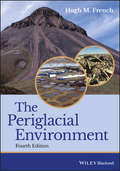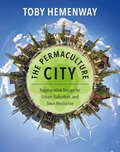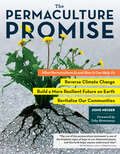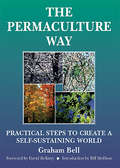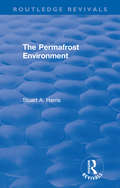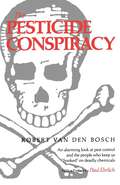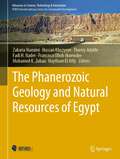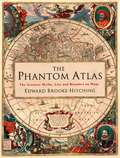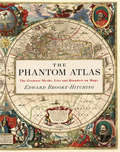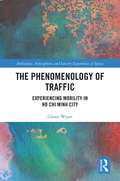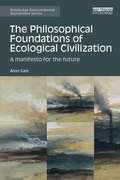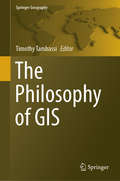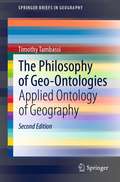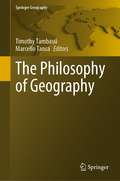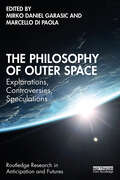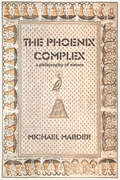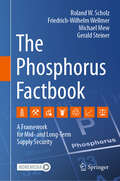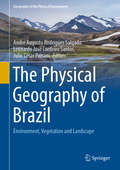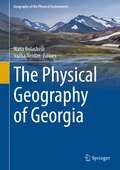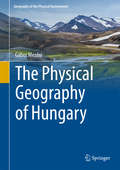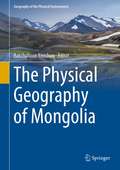- Table View
- List View
The Periglacial Environment
by Hugh M. FrenchThe Periglacial Environment, Fourth Edition, is an authoritative overview of the world’s cold, non-glacial environments. First published in 1976 and subsequently revised in 1996 and 2007, the text has been the international standard for nearly 40 years. The Fourth Edition continues to be a personal interpretation of the frost-induced conditions, geomorphic processes and landforms that characterize periglacial environments. Part One discusses the periglacial concept and describes the typical climates and ecosystems that are involved. Part Two describes the geocryology (permafrost science) associated with frozen ground. Part Three outlines the weathering and geomorphic processes associated with cold-climate conditions. Part Four provides insight into the periglacial environments of the Quaternary, especially the Late Pleistocene. Part Five describes some of the problems associated with human occupancy in regions that experience frozen ground and cold-climate conditions. Extensively revised and updated Written by an expert with over 50 years of field research Draws upon the author’s personal experience from Northern Canada, Alaska, Siberia, Tibet, Antarctica, Svalbard, Scandinavia, southern South America, Western Europe and eastern North America This book is an invaluable reference for advanced undergraduates in geography, geology, earth sciences and environmental sciences programs, and to resource managers and geotechnical engineers interested in cold regions.
The Periodic Table for Young Scientists (Your Expert Guide #1)
by Dr Dr Kit ChapmanFrom a top expert in the world of science comes this definitive guide to the Periodic Table, published in partnership with the Royal Society of Chemistry.In Your Expert Guide: The Periodic Table, discover the origins and genius of the Periodic Table: how the idea came about, what each symbol means and how it underpins our understanding of matter, materials and the study of chemistry. Explore the elements at work in our world and get a clear picture of the Periodic Table's role in explaining the building blocks of the Universe.Written by Dr Kit Chapman, award-winning science journalist, academic at Falmouth University and global science communicator. Published in partnership with The Royal Society of Chemistry, the internationally renowned nonprofit organisation with the same mission since 1841: to advance excellence in the chemical sciences. With lovely artwork by Dao Linh, see the elements come alive for curious readers aged 8+.Books in the Your Expert Guide series:With the Royal Society of Chemistry: The Periodic Table and Chemistry for Young ScientistsWith the Royal Society of Biology: The Human Body and Biology for Young ScientistsWith the Institute of Physics: The Universe for Kids and Physics for Young Scientists
The Periodic Table of Cocktails
by Emma StokesThirty young environmental activists share their dreams with voice of a generation Mya-Rose CraigIndigenous people and people of color are disproportionately affected by climate change. And yet they are underrepresented within the environmental movement. But not anymore. Written by the extraordinary environmental and campaigner for equal rights Mya-Rose Craig—aka Birdgirl—this book profiles 30 young environmental activists who are Indigenous people or people of color, from communities on the frontline of global climate change. Each speaks to the diverse set of issues they are fighting for, from water conservation, to deforestation, to indigenous rights, and shares their dream . . . A dream for climate justice. A dream for a healthy planet. A dream for a fairer world, for all. This is the first book from Craig, who shared a stage with Greta Thunberg in 2019&’s climate strikes. US-based activists profiled include Marshallese ocean activist Litokne Kabua; @ThisIsZeroHour founder Zanagee Artis; indigenous rights activists Thomas Tonatiuh Lopez Jr., and Caitlyn Baikie; climate justice activist Rebeca Sabnam, and clean water activist Autumn Peltier.
The Permaculture City: Regenerative Design for Urban, Suburban, and Town Resilience
by Toby HemenwayPermaculture is more than just the latest buzzword; it offers positive solutions for many of the environmental and social challenges confronting us. And nowhere are those remedies more needed and desired than in our cities.The Permaculture City provides a new way of thinking about urban living, with practical examples for creating abundant food, energy security, close-knit communities, local and meaningful livelihoods, and sustainable policies in our cities and towns. The same nature-based approach that works so beautifully for growing food—connecting the pieces of the landscape together in harmonious ways—applies perfectly to many of our other needs. Toby Hemenway, one of the leading practitioners and teachers of permaculture design, illuminates a new way forward through examples of edge-pushing innovations, along with a deeply holistic conceptual framework for our cities, towns, and suburbs.The Permaculture City begins in the garden but takes what we have learned there and applies it to a much broader range of human experience; we&’re not just gardening plants but people, neighborhoods, and even cultures. Hemenway lays out how permaculture design can help towndwellers solve the challenges of meeting our needs for food, water, shelter, energy, community, and livelihood in sustainable, resilient ways. Readers will find new information on designing the urban home garden and strategies for gardening in community, rethinking our water and energy systems, learning the difference between a &“job&” and a &“livelihood,&” and the importance of placemaking and an empowered community.This important book documents the rise of a new sophistication, depth, and diversity in the approaches and thinking of permaculture designers and practitioners. Understanding nature can do more than improve how we grow, make, or consume things; it can also teach us how to cooperate, make decisions, and arrive at good solutions.
The Permaculture Promise: What Permaculture Is and How It Can Help Us Reverse Climate Change, Build a More Resilient Future on Earth, and Revitalize Our Communities
by Toby Hemenway Jono NeigerPermaculture is a sustainability buzzword, but many people wonder what it actually means and why it is relevant. Originally coined by combining the words permanent and agriculture, permaculture has evolved into an optimistic approach connecting all the systems of human life: gardening, housing, transportation, energy, and how we structure our communities. The Permaculture Promise explains in simple terms why permaculture may be the key to unlocking a livable future on our planet. Author Jono Neiger asserts that humans can thrive while simultaneously making Earth healthier and not destroying it. The book shows 22 ways that permaculture can create a better future for all living things. Profiles of people and communities — including an urban dweller who tore up her driveway to create a vegetable garden and a California housing development that dedicates a third of its land to parks, orchards, and gardens — will inspire you to incorporate permaculture principles into your life today.
The Permaculture Way
by Graham BellThe Permaculture Way shows us how to consciously design a lifestyle which is low in environmental impact and highly productive. It demonstrates how to meet our needs, make the most of resources by minimizing waste and maximizing potential, and still leave the Earth richer than we found it.
The Permafrost Environment (Routledge Revivals)
by Stuart A. HarrisOriginally published in 1986, The Permafrost Environment examines how the search for oil, gas and minerals in the arctic region instigated new and vitally important needs to understand the permafrost environment. The construction of roads, airfields, buildings and pipelines in this inhospitable environment has posed enormous problems for engineers and geologists. This book is a comprehensive review of the nature of the permafrost environment and its utilization. It looks at environmental processes and their effects and examines the management problems which result. It provides a detailed look at how normal procedures for construction etc. need to be modified to cope with the special conditions and it gives examples from throughout the arctic region, including Canada, Siberia, Alaska, Greenland and Northern Scandinavia.
The Pesticide Conspiracy
by Robert Van Den BoschProfessor van den Bosch of the University of California was one of the developers of Integrated Pest Management—the use of biological controls, improved pest knowledge and observation, and judicious application of chemicals only when absolutely necessary. His research often suggested that less or no pesticides should be applied, which made him the target of both open and clandestine attack from industry and government figures. In protest, he wrote this passionate account of what Ecology called "the ultimate social disaster of: evolving pesticide-resistant insects, the destruction of their natural predators and parasites, emergent populations of new insect pests, downstream water pollution, atmospheric pollution, the 'accidental' killing of wildlife and people, and the bankruptcies of indigenous and small farmers."As a new Introduction to this edition recounts, some lessening of dangerous overreliance on massive pesticide applications has been achieved since van den Bosch published this book in 1978—partly as a result of its influence. But the structural problems he described remain. The book has thus become a classic, along with Rachel Carson's Silent Spring.
The Pesticide Detox: Towards a More Sustainable Agriculture
by Jules PrettySince the 1960s, the world's population has more than doubled and agricultural production per person has increased by a third. Yet this growth in production has masked enormous hidden costs arising from widespread pesticide use - massive ecological damage and high incidences of farmer poisoning and chronic health effects. Whereas once the risks involved with pesticide use were judged to be outweighed by the potential benefits, increasingly the external costs of pesticides, to environments and human health, are being seen as unacceptable. In response to this trend, recent years have seen millions of farmers in communities around the world reduce their use of harmful pesticides and develop cheaper and safer alternatives. The Pesticide Detox explores the potential for the phasing-out of hazardous pesticides and the phasing-in of cost effective alternatives already available on the market. This book makes clear that it is time to start the pesticide detox and to move towards a more sustainable agriculture.
The Pet Poo Pocket Guide: How to Safely Compost and Recycle Pet Waste
by Rose SeemannGet the scoop on reducing the environmental footprint of your furry friendsEighty-three million dogs and ninety-six million cats call the United States home. Dogs alone produce enough waste to fill more than 1,091 football fields 1 foot deep in a single year. Add billions of plastic pick-up bags to the mix and season well with tons of litter box waste. Scoop a hefty portion into local landfills and seal it tightly to ensure optimal methane production. Clearly, this is a recipe for disaster.Dog and cat owners who trash their pets' offerings daily are in denial about how much waste is produced and what happens to it. Those who want to make the responsible choice often turn to the internet, only to find misleading, confusing, and contradictory information. The Pet Poo Pocket Guide will help you reduce your pet's environmental paw print with:Best practices for cycling pet waste back to natureSuggestions on how to tailor your approach based on location, situation, weather, needs, or available timeInstructions for using your composted pet waste safely to enrich your soil and nourish ornamental plantsWith recycling tactics clearly indicated as "easy," "moderate," or "demanding," The Pet Poo Pocket Guide offers something for everyone. This no-nonsense guide is a must-read for any pet owner who is concerned about the environmental impact of their best friend, and is seeking a safe and practical solution.Rose Seemann is the owner and operator of EnviroWagg, a company dedicated to collecting and composting canine waste into safe, nutrient-rich garden soil.
The Phanerozoic Geology and Natural Resources of Egypt (Advances in Science, Technology & Innovation)
by Zakaria Hamimi Haytham El Atfy Hassan Khozyem Thierry Adatte Fadi H. Nader Francisca Oboh-Ikuenobe Mohamed K. ZobaaThe Phanerozoic Geology and Natural Resources of Egypt includes a series of chapters written by highly qualified group of researchers whose expertise is recognized and appreciated not only in Egypt, but also in the world over. The chapters span a wide range of geological subdisciplines including tectonics, paleogeography, stratigraphy, sedimentology, paleontology, groundwater, and energy resources, just to name a few. In this regard, the book provides the reader with ample knowledge about the different facets of the fascinating and always intriguing geology of Egypt since the Precambrian time. For a junior researcher or a geoscience student, the book is a comprehensive, multidisciplinary one-stop resource that they will continue to reference and rely on for years to come. For a more experienced scientist, the book summarizes the current state of knowledge, highlights the magnitude of complexity of the geology of Egypt and northeast Africa, and reveals potential areas where future research should be directed. The book is written in simple, easy to understand English language and contains very useful high-quality illustrations. Last but not least, The Phanerozoic Geology and Natural Resources of Egypt has been reviewed and edited by world class, highly ranked geoscientists from Egypt, Europe, and USA.
The Phantom Atlas: The Greatest Myths, Lies and Blunders on Maps
by Edward Brooke-HitchingThe Phantom Atlas is an atlas of the world not as it ever existed, but as it was thought to be. These marvellous and mysterious phantoms - non-existent islands, invented mountain ranges, mythical civilisations and other fictitious geography - were all at various times presented as facts on maps and atlases. This book is a collection of striking antique maps that display the most erroneous cartography, with each illustration accompanied by the story behind it. Exploration, map-making and mythology are all brought together to create a colourful tapestry of monsters, heroes and volcanoes; swindlers, mirages and murderers. Sometimes the stories are almost impossible to believe, and remarkably, some of the errors were still on display in maps published in the 21st century. Throughout much of the 19th century more than 40 different mapmakers included the Mountains of Kong, a huge range of peaks stretching across the entire continent of Africa, in their maps - but it was only in 1889 when Louis Gustave Binger revealed the whole thing to be a fake. For centuries, explorers who headed to Patagonia returned with tales of the giants they had met who lived there, some nine feet tall. Then there was Gregor MacGregor, a Scottish explorer who returned to London to sell shares in a land he had discovered in South America. He had been appointed the Cazique of Poyais, and bestowed with many honours by the local king of this unspoiled paradise. Now he was offering others the chance to join him and make their fortune there, too - once they had paid him a bargain fee for their passage... The Phantom Atlas is a beautifully produced volume, packed with stunning maps and drawings of places and people that never existed. The remarkable stories behind them all are brilliantly told by Edward Brooke-Hitching in a book that will appeal to cartophiles everywhere.
The Phantom Atlas: The Greatest Myths, Lies and Blunders on Maps
by Edward Brooke-HitchingDiscover the mysteries within ancient maps — Where exploration and mythology meetThis richly illustrated book collects and explores the colorful histories behind a striking range of real antique maps that are all in some way a little too good to be true.Mysteries within ancient maps: The Phantom Atlas is a guide to the world not as it is, but as it was imagined to be. It's a world of ghost islands, invisible mountain ranges, mythical civilizations, ship-wrecking beasts, and other fictitious features introduced on maps and atlases through mistakes, misunderstanding, fantasies, and outright lies.Where exploration and mythology meet: Author Edward Brooke-Hitching is a map collector, author, writer for the popular BBC Television program QI and a Fellow of the Royal Geographical Society. He lives in a dusty heap of old maps and books in London investigating the places where exploration and mythology meet.Cartography’s greatest phantoms: The Phantom Atlas uses gorgeous atlas images as springboards for tales of deranged buccaneers, seafaring monks, heroes, swindlers, and other amazing stories behind cartography's greatest phantoms.If you are a fan of this popular genre and a reader of books such as Prisoners of Geography, Atlas of Ancient Rome, Atlas Obscura, What If, Book of General Ignorance, or Thing Explainer, your will love The Phantom Atlas
The Phenomenology of Traffic: Experiencing Mobility in Ho Chi Minh City (Ambiances, Atmospheres and Sensory Experiences of Spaces)
by Glenn WyattThe book delves into the affective, embodied, and sensory dimensions of traffic and urban mobility. It brings together key phenomenological and post-phenomenological readings to challenge taken for granted assumptions of urban traffic. Through the experiences of traffic users in Ho Chi Minh City, Vietnam, the book provides fascinating pathways into structures and processes that make up phenomenal traffic worlds. It explores the nature of the traffic experience, modalities of existence within it, and the wide spectrum of awarenesses involved in making sense from non-sense. The book offers rich theoretical insights on how we feel our way through our affect-laden worlds. Through empirical examples from the urban traffic in Ho Chi Minh City, the book explores this fluid, constantly changing complex collective of ongoing negotiations we call ‘traffic,’ often emotional, involving and producing all kinds of entities. It develops a range of philosophical concepts in order to better understand the complex relationships between humans and non-humans in everyday settings. Offering innovative insights into the structures, authorities, materialities and forms of power that shape our experiences of traffic, this book will be of interest to students, scholars and practitioners interested in philosophy, cultural geography, mobilities, transport studies, cultural studies, and urban studies.
The Philosophical Foundations of Ecological Civilization: A manifesto for the future (Routledge Environmental Humanities)
by Arran GareThe global ecological crisis is the greatest challenge humanity has ever had to confront, and humanity is failing. The triumph of the neo-liberal agenda, together with a debauched ‘scientism’, has reduced nature and people to nothing but raw materials, instruments and consumers to be efficiently managed in a global market dominated by corporate managers, media moguls and technocrats. The arts and the humanities have been devalued, genuine science has been crippled, and the quest for autonomy and democracy undermined. The resultant trajectory towards global ecological destruction appears inexorable, and neither governments nor environmental movements have significantly altered this, or indeed, seem able to. The Philosophical Foundations of Ecological Civilization is a wide-ranging and scholarly analysis of this failure. This book reframes the dynamics of the debate beyond the discourses of economics, politics and techno-science. Reviving natural philosophy to align science with the humanities, it offers the categories required to reform our modes of existence and our institutions so that we augment, rather than undermine, the life of the ecosystems of which we are part. From this philosophical foundation, the author puts forth a manifesto for transforming our culture into one which could provide an effective global environmental movement and provide the foundations for a global ecological civilization.
The Philosophy of GIS (Springer Geography)
by Timothy TambassiThis anthology aims to present the fundamental philosophical issues and tools required by the reflection within and upon geography and Geographic Information Systems (GIS) . It is an introduction to the philosophy for GIScience from an analytical perspective, which looks at GIS with a specific focus on its fundamental and most general concepts and distinctions. The first part of the book is devoted to explore some of the main philosophical questions arising from GIS and GIScience, which include, among others, investigations in ontology, epistemology, linguistics and geometrical modeling. The second part concerns issues related to spatial and cartographical representations of the geographical world. The third part is focused on the ontology of geography, specifically in terms of geographical entities, objects and boundaries. Finally, in the fourth part, the topic of GIS constitutes a starting point for exploring themes such as quantum geography and disorientation, and for defining professional profiles for geographers with competences in GIS environment. This book on a new and unexplored field of research could be a fundamental point of reference for professional philosophers and geographers interested in the theoretical reflection about the foundational concepts of GIScience. It is also interesting reading material for students (both undergraduates, postgraduates and Ph.D. students) in philosophy, geography, applied ontology, GIScience, geomatics and computer science.
The Philosophy of Geo-Ontologies: Applied Ontology of Geography (SpringerBriefs in Geography)
by Timothy TambassiPlaced at the intersection among philosophy, geography, and computer science, the domain of investigation of applied ontology of geography ranges from making explicit assumptions and commitments of geography as a discipline, to the theoretical and technical needs of geographical/IT tools, such as GIS and geo-ontologies. Such a domain of investigation represents the central topic of discussion of this book, which intends: 1) to provide an overview of the mutual interactions among the disciplines encompassed in the domain; 2) to discuss notions such as spatial representation, boundaries, and geographical entities that constitute the main focus of the (philosophical) ontology of geography; 3) to propose a geographical classification of geo-ontologies in response to their increasing diffusion within the contemporary debate, as well as to show what ontological categories best systematize their contents. The second edition of the book differs from the first one as it offers a broader analysis of the (philosophical) ontology of geography: an analysis that is no more limited to the theoretical need of geo-ontologies.
The Philosophy of Geography (Springer Geography)
by Timothy Tambassi Marcello TancaThe relationship between geography and philosophy is still largely in need of being explored. Geographers and philosophers share the responsibility for that. On the one hand, geographers have considered as a dangerous deviation any attempt to elaborate an image of the Earth which was not a mere replica of a cartographic representation. On the other hand, philosophers have generally been uninterested in a discipline offering little chance for critical reflection. In light of these considerations, the purpose of this book is to identify some fundamental philosophical issues involved in the reflection of geography by adopting a perspective which looks at the discipline with a specific focus on its fundamental concepts and distinctions.
The Philosophy of Outer Space: Explorations, Controversies, Speculations (Routledge Research in Anticipation and Futures)
by Mirko Daniel Garasic Marcello Di PaolaThis volume provides a rigorous philosophical investigation of the rationales, challenges, and promises of the coming Space Age.Over the past decade, space exploration has made significant and accelerating progress, and its potential has attracted growing attention from science, states, businesses, innovators, as well as the media and society more generally. Yet philosophical theorizing concerning the premises, values, meanings, and impacts of space exploration is still in its infancy, and this potentially immense field of study is far from mainstream yet. This book advances outer space philosophy by integrating key scientific and societal debates sparked by recent developments in space research and activities with conceptual, existential, ethical, aesthetic, and political themes and concerns. It maps various regions of philosophical exploration, reflection, and speculation regarding humanity’s present and future emanations into outer space, to promote a broad, rich, and nuanced societal debate regarding this transformative enterprise, which is as stimulating as it can be disorienting.This book will be a fascinating read for academics, researchers, and students interested in philosophy, space studies, science and technology studies, future studies, and sustainability.
The Phoenix Complex: A Philosophy of Nature
by Michael MarderAn innovative, wide-ranging consideration of the global ecological crisis and its deep philosophical and theological roots.Global crises, from melting Arctic ice to ecosystem collapse and the sixth mass extinction, challenge our age-old belief in nature as a phoenix with an infinite ability to regenerate itself from the ashes of destruction. Moving from antiquity to the present and back, Michael Marder provides an integrated examination of philosophies of nature drawn from traditions around the world to illuminate the theological, mythical, and philosophical origins of the contemporary environmental emergency. From there, he probes the contradictions and deadlocks of our current predicament to propose a philosophy of nature for the twenty-first century.As Marder analyzes our reliance on the image and idea of the phoenix to organize our thoughts about the natural world, he outlines the obstacles in the path of formulating a revitalized philosophy of nature. His critical exposition of the phoenix complex draws on Chinese, Indian, Russian, European, and North African traditions. Throughout, Marder lets the figure of the phoenix guide readers through theories of immortality, intergenerational and interspecies relations, infinity compatible with finitude, resurrection, reincarnation, and a possibility of liberation from cycles of rebirth. His concluding remarks on a phoenix-suffused philosophy of nature and political thought extend from the Roman era to the writings of Hannah Arendt.
The Phosphorus Factbook: A Framework for Mid- and Long-Term Supply Security
by Roland W. Scholz Friedrich-Wilhelm Wellmer Gerald Steiner Michael MewThis book provides a conceptual framework, presenting a description and modelling of the regulating mechanisms of supply, demand and supply-demand dynamics, sketches the most relevant classification systems of phosphorus deposits and outlines how they are related and how they should be improved to provide reliable, comparable classification, which is accepted by mining companies, geological surveys, science, industry, politicians and the public. For anticipating how the phosphate reserves are increasing (by increasing market values of phosphorus), we use the Cumulative Availability Curve (CAC) approach. The presented data for supply and demand dynamics reveal that—given our current knowledge—due to the abundance of phosphate rock, sufficient phosphorus supply will be feasible for at least 1000 years. The book stresses desiderata in knowledge and technology development, particularly for the reduction of losses and thus a decrease of negative environmental impacts and an improvement of the use efficiency. The book is designed as a fact book. For all essential statements e.g.: Mineral phosphorus will be available for at least a millienium rather than 300 years. The total use efficiency of phosphorus is less than 10%, the reader will find solid scientific references or calculations which can be used by researchers, mineral industry and business actors, policymakers, governmental institutions, NGOs, etc.
The Physical Geography of Brazil: Environment, Vegetation and Landscape (Geography of the Physical Environment Ser.)
by André Augusto Rodrigues Salgado Leonardo José Cordeiro Santos Julio César PaisaniThis book presents the Brazilian natural space and environment. It describes the main environmental aspects of Brazil in relation to geology, climate, geomorphology, vegetation, fauna, water resources and environmental issues. The book presents a beautifully illustrated overview of the physical geography of the Amazon Forest, the central Brazilian savannah (Cerrado), the Cocais Forest, the semi-arid area (Caatinga), the Atlantic Forest area, the Pantanal (Brazilian wetlands), the Auraucárias Plateau, the Pampas area (South grasslands) and the Brazilian Coastal Environment (beaches and mangroves).
The Physical Geography of Georgia (Geography of the Physical Environment)
by Nana Bolashvili Vazha NeidzeThis book is the first to give a comprehensive and detailed overview of the complete physical geography of Georgia in English. It discusses natural and environmental conditions, hydrology, geomorphology, landscapes, and resources and elaborates issues of environmental protection, natural hazards, resource potentials, tourism and many other topics of this multifaceted country.This volume will appeal to researchers, educators and students in the fields of natural and environmental sciences, geography, geology, regional studies and related areas.
The Physical Geography of Hungary
by Gábor MezősiThis book presents the most comprehensive and detailed overview of the physical environment of Hungary. The book makes a specific effort to connect regional geography with natural forcing and influencing factors. The first section discusses general characteristics relating to the physical geography of Hungary on a more theoretical basis including relief evolution, climate, hydrography, soils and vegetation. The second part focuses on regional content and analyzes conflicts, environmental values, threats and impacts of the different geographical units. This book appeals to researchers as well as students of physical geography and related disciplines and serves as a useful source for regional information on Hungary. This book can also be used as a field guide of the physical properties of this European country.
The Physical Geography of Mongolia (Geography of the Physical Environment)
by Batchuluun YembuuThis book gives the most detailed and comprehensive physico-geographical overview of the very unique country of Mongolia. The country offers diverse geographical features and natural landscapes combined with a long history. This book offers integrated and systematical research on the geophysical characteristics of Mongolia with an academic orientation. It provides the readers with general knowledge of the physical geography of Mongolia as well as new results of the latest research. The volume consists of 11 chapters, each written by field experts, with contributions from scientific researchers from Mongolia.The topics covered: geological and geomorphological characteristics and processes, landscapes and landforms, climate and climate change, hydrology, glaciers and permafrost, soils, environmental changes, biodiversity and many other aspects of physical geography in Mongolia.The book appeals to researchers and students of geography and related fields and can serve as a guide for field trips to Mongolia or basic literature for research projects.
